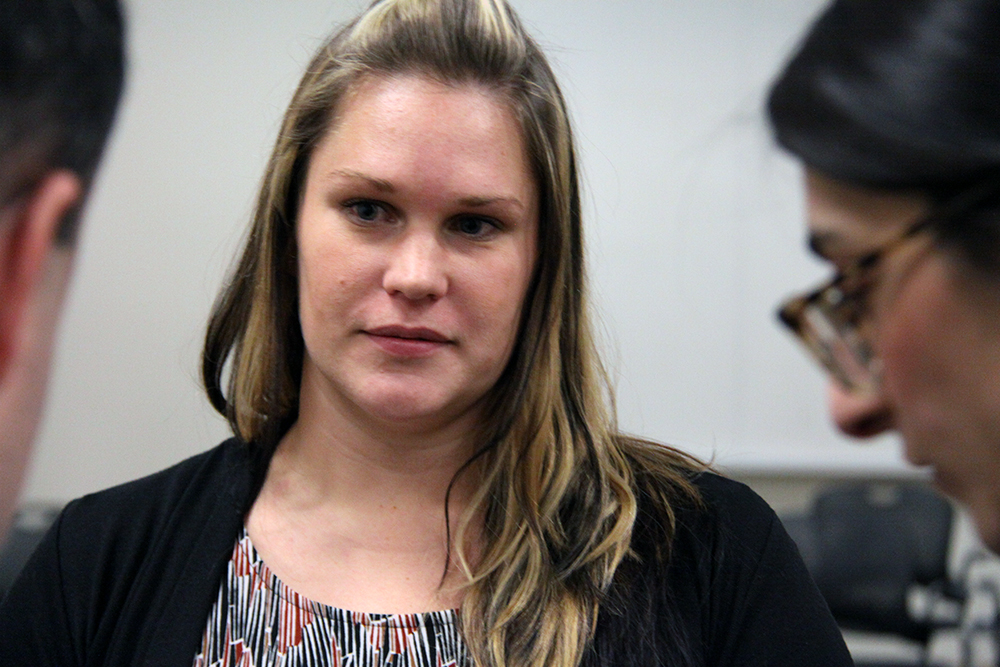
Jessica Jacobson (Kirk Carapezza/WGBH).
Massachusetts is joining a growing number of states that want to better regulate for-profit colleges. The Attorney General’s office is taking testimony this week on new rules that would strengthen oversight of colleges that don’t have tax-exempt status and rely on tuition and stock market investors.
For-profit schools are increasingly coming under fire for questionable recruitment practices and heavy student debt burdens.
For Jessica Jacobson of Lunenberg, her $146,000 dollars in federal and private student loan debt is so stressful — so crushing — that it often causes her anxiety and depression.
"The whole point of going to college was to be able to have your kids be better off than you were growing up, and with my debt, I don’t know that is ever going to be possible," Jacobson said. "And that just makes me extremely sad. I feel stuck.”
Stuck, at 30 years old, Jacobson says she doubts whether she’ll ever be able to get ahead.
When she first enrolled at The New England Institute of Art to study animation, she was hoping to gain the edge in a tight job market. Her goal was to find work in the media, in post-production.
"They had a lot of computer rooms," Jacobson said. "That's what got me really wanting to go to that school was the equipment and the studios."
But Jacobson says after she enrolled, the school didn't allow her to use any of that high-end equipment that had swayed her to attend. She says the recruiters were more salespeople than advisors. Now, unemployed and with few job prospects, Jacobson feels she was deceived.
"I wanted to get into special effects," she said. "That’s exactly what I wanted to do. So when it came to one of our projects, I wasn’t allowed to use the studio. What I had to do was tape up green pieces of paper to a wall.”
Jacobson says she’s the first person in her family to go to college. Looking back, she admits she had no idea how much debt she was taking on.
“The application process was one day," she said. "I went in, signed a bunch of papers. I had no single advisor. The financial advisors changed so many times I couldn’t even keep track of who my financial advisor was at the time when I was enrolled.”
The Art Institute wouldn’t address Jessica’s accusations directly, but Pittsburgh-based spokesman Tyler Gronbach told WGBH News he isn't sure how many financial and career advisors the Art Institute employs.
He does say the company has a culture built on trust.
“Student success, integrity and innovation," he said. "That’s what we offer to the students who come to the school. We have people that work on financial aid and then we have people that also work on career placement upon graduation to help people find jobs.”
Still, former students of for-profit schools like the New England Art Institute account for nearly half of all student loan defaults.
To prevent more students from falling into similar situations, attorneys general in Massachusetts and at least 22 other states are endorsing new regulations that would require all for-profit schools to provide accurate information to the public, prohibit misleading advertisements, and to address unfair lending practices.
"We’ve been concerned about schools that don’t really disclose what the tuition and fees are about,” said Massachusetts Attorney General Martha Coakley.
Coakley points out that for-profit schools continue to get the bulk of their revenue from federal student aid, leaving students with massive debt loads and credentials that give them little help in finding a job.
"The worst thing is to see a student who doesn’t have a job, thinks by investing in a certificate program, borrowing money for that, thinking they’ll improve their chances and they find out that they can’t find a job," she said. "The certificate may not prepare them for any job, and now they are in debt.”
Some critics, though, like Howard Horton, president of New England College of Business and Finance, say the proposed regulations would go too far.
In his testimony, Horton said his for-profit college is already regulated by the New England Association of Schools and Colleges, so the state should make certain distinctions.
“As with any industry, there’s a wide range of players," he said. "And what we don't want to do is add expense to institutions that are already struggling to keep costs down because that gets passed on to students in the form of higher tuition.”
Horton worries some institutions could be swept up in a broad attempt to discredit for-profit colleges.
“I think that this is a good effort, but I’m not sure it’s coordinated well enough with the existing structure that exists today,” he said.
The Department of Education has acted. It’s taken a closer look at misrepresentation and admissions practices. But for students like Jacobson, who are struggling to pay off their student loans, it’s not enough.
“I’ve had to move from Boston," she said. "I loved living in Boston, but unless I wanted to stay being a waitress, I couldn’t get a job out here.”
This summer, Jacobson was laid off from Home Depot, and now she’s back home with her parents in Lunenberg.
The Massachusetts Attorney General’s office will hold another public hearing Thursday in Springfield.
Related: Frontline's Educating Sergeant Pantzke, including audio clips of a call from a for-profit college admissions representative.










